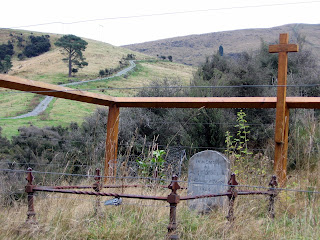That makes no show for Morn —
By Stretch of Limb — or stir of Lid —
An independent One —
Was ever idleness like This?
Upon a Bank of Stone
To bask the Centuries away —
Nor once look up — for Noon?
F463
(1862) J654
For many of us our most famous day will be
the one where we don’t wake up. The news will go out and people who haven’t
thought of you in years will suddenly tweet about your penchant for tortilla
chips and ice cream. In discussing the long and famous sleep, Dickinson here
takes another look here at what it means to be dead. For a rather Gothic poet, she
expresses a surprisingly mellow view of the experience.
The
(probably) hypothetical subject of the poem died in bed during the night.
Consequently she’s not yawning or trying to open her eyes when morning arrives.
Her sleep is “independent” now, no longer needing either her or her bed. It has
taken over now, leading its own idle existence through the corpse.
Dickinson conveyed
a similar sense of being in for a long, long sleep in F124, “Safe in their
alabaster chambers.” In that poem the “meek members of the Resurrection” are
“Untouched by morning – / And untouched by noon” and will be sleeping there
while “Worlds scoop their Arcs – / And firmaments – row.” Perhaps her sleepers
simply didn’t hear the trumpet call of Resurrection and so continue sleeping
century after century, but I think it more likely that Dickinson is suggesting
that you could wait forever for that trumpet to blow. In this poem the dead are also going to sleep for centuries. Having missed the morning wake-up call, they sleep through noon as well with no indication that they will ever wake up or be raised.
 Being
dead is not a bad thing, though. In F124 the dead sleep in “alabaster chambers” with “Rafter of satin and roof of stone.” In the current one they “bask” on their bank of stone. It is an image we saw in F238, “How many
times these low feet staggered,” with the “Indolent Housewife” lying in the
daisies. In F417, “The Months have ends – the Years – a knot,” the earth tucks
the dead into her “mysterious Drawers” where they will have “An ultimate
Repose.” See? It’s just like sleeping …
Being
dead is not a bad thing, though. In F124 the dead sleep in “alabaster chambers” with “Rafter of satin and roof of stone.” In the current one they “bask” on their bank of stone. It is an image we saw in F238, “How many
times these low feet staggered,” with the “Indolent Housewife” lying in the
daisies. In F417, “The Months have ends – the Years – a knot,” the earth tucks
the dead into her “mysterious Drawers” where they will have “An ultimate
Repose.” See? It’s just like sleeping …
The
first line of the poem is a ‘dead’ giveaway as to this theme: It stretches on
and on and simplty cannot be hurried. The dashes slow it down as do the word
sounds. But once we get past that great slowdown, the poem picks up to a normal
pace. The last two lines practically trip off the tongue.
Another version of the poem reads “Within a
hut of stone” rather than “Upon a Bank of Stone.” I think the “Bank” is better
for we picture the sleeper in her tomb as if she were asleep on a riverbank rather
than shut up in a little hut.
ED sounds not only laidback about death, there’s a longing sound to Stanza 2:
ReplyDeleteWas ever idleness like This?
Upon a Bank of Stone
To bask the Centuries away —
Nor once look up — for Noon?
Franklin estimates ED copied this poem into Fascicle 22 “about late 1862”. During that year she copied 226 poems into fascicles. In 1863 she copied 295 poems into fascicles. No wonder ED longed for “idleness . . . to bask the centuries away, nor once look up for noon.” Death sounds not so bad when you’re exhausted from turning out almost a poem a day.